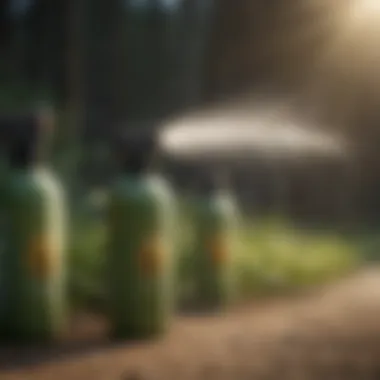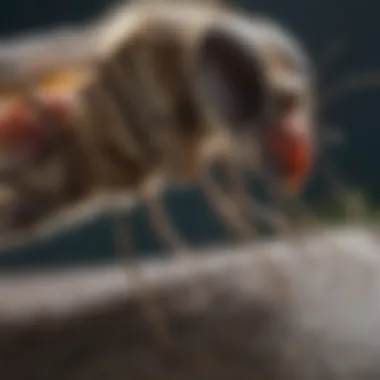Efficient Mosquito Control: Choosing the Right Spray


Preventive Pest Control Strategies
To effectively manage mosquitoes and prevent their proliferation on your property, a proactive approach towards pest control is necessary. By employing preventive pest control strategies, you can minimize the likelihood of infestations. These strategies include protecting the house exterior, maintaining the yard, ensuring indoor cleanliness, competently disposing of garbage, and using innovative preventive measures.
House Exterior Protection
Providing protection for the house exterior plays a significant role in preventing pest entry. Here are some practical steps:
- Sealing Cracks: Inspect and seal any gaps in windows, doors, and walls. Caulking or weather stripping can help close these entry points effectively.
- Clearing Debris: Remove clutter and debris from around the home. Items such as leaves, wood piles, and standing water can attract pests.
- Preventing Pests from Entering: Ensure that doors and windows fit tightly. Installing screens can also act as barriers against unwanted guests.
Yard Maintenance
Effective yard maintenance is crucial in keeping mosquitoes away. Consider the following essential practices:
- Cutting Long Grass: Regularly mowing the lawn reduces hides for pests.
- Trimming Bushes: Overgrown foliage can provide resting spots for mosquitoes. Cutting them back allows for better airflow and sun exposure.
- Managing Water: Ensure there are no standing water collections, as these are breeding grounds for mosquitoes.
Indoor Cleanliness
Keeping a clean indoor environment is also important for pest prevention. Follow these expert tips:
- Regular Cleaning: Often vacuum and dust to eliminate food sources and habitats for pests.
- Food Storage: Store food in tightly sealed containers and dispose of leftovers promptly to avoid attracting insects.
- Dehumidification: Use dehumidifiers in areas prone to moisture to create a less conducive environment for pests.
Garbage Disposal
Efficient waste disposal methods can significantly impact pest control:
- Ensure garbage bins have tight-fitting lids.
- Regularly remove trash, particularly food waste that attracts pests.
- Clean trash areas often to prevent odors and potential infestations.
Other Pest Prevention Strategies
Explore innovative approaches to safeguard your home against pests:
- Supporting Natural Predators: Consider creating a bio-friendly environment where natural predator species thrive.
- Using Plants: Introduce specific plants that repel mosquitoes, such as citronella and marigold.
- Community Involvement: Engaging with your neighbors on pest control efforts can create an effective combined approach to reducing pest populations.
Effective pest control starts with methodical efforts to prevent their access and thrive. By maintaining your environment, you autonomously keep your spaces safe.
Taking the time to implement these preventive measures will greatly enhance the effectiveness and sustainability of pest control practices. The benefits compound over time, leading to a significantly more relaxing and enjoyable outdoor experience without the constant nuisance of mosquitoes.
Understanding Mosquito Control
Efficient mosquito control is essential for maintaining a pleasant and safe outdoor environment. Understanding this control begins with recognizing the biological nature of mosquitoes. These insects thrive in warm, humid areas, and can breed quickly in stagnant water. Risks associated with mosquitoes extend beyond mere annoyance; they carry various diseases, including West Nile virus and Zika virus. Therefore, effective control is not just about comfort, but also about public health.
Poor mosquito management may result in increased populations, leading to higher risks of disease transmission to humans and animals. Every homeowner should be aware of their surroundings and take necessary actions to mitigate mosquito problems. Emphasizing prevention and reduction is crucial, as even an established population can be tackled with appropriate strategies.
Environmental impacts play a notable role in mosquito control. Chemical sprays may address the issue quickly but can harm beneficial insects and other wildlife. Understanding the balance between effective control measures and environmental responsibility is vital for long-term success. Opting for integrated pest management approaches will yield better outcomes for both humans and ecosystems.
The Importance of Mosquito Control
The journey to effective mosquito control starts with recognizing its significance. Preventing high mosquito populations will not only improve outdoor experiences but also safeguard families from mosquito-borne illnesses. With preventive measures in place, including maintaining one's yard and choosing the right sprays, households will notice the benefits. Notably, insecticides applied via backpack blowers for expansive outdoor areas promote effective coverage while ensuring efficient application. Adequate understanding of timing and application further enhances efficiency.
Plus, failure to control mosquito populations can escalate challenges. Rising numbers of mosquitoes often lead to aggressive infestations, which crreate an uncomfortable living environment. Relying exclusively on sporadic or less effective methods may cause failing attempts that frustrate homeowners and undermine their objectives. Overall, the requirement for effective mosquito control cannot be overstated, as preventing healthy populations is a shared responsibility.
Common Techniques for Mosquito Management


Diverse methods exist for managing and mitigating mosquito populations. Awareness of these options allows homeowners to align solutions with their specific environment. Here are some common techniques applicable to outdoor mosquito management:
- Source Reduction: This involves eliminating standing water where mosquitoes breed. Homeowners should systematically inspect and remove water from gutters, planters, pet bowls, and birdbaths.
- Larvivorous Fish: Introduced purposefully into water features, some fish, such as tilapia and goldfish, feed on mosquito larvae, thus providing natural control.
- Insecticide Sprays: Various sprays are potent in managing adult populations. Selection needs careful consideration of active ingredients and environmental impacts to balance efficiency and ecological consequences.
- Public and Community Efforts: Collective efforts between neighbors can lead to community-wide solutions. Outreach, shared resources, and designated spraying days open communication lines to strengthen hunting down mosquitoes.
Engaging in all such common techniques will effectively lower the mosquito populations. Combining methods yields better outcomes, ensuring duration and impact against these persistent pests.
Backpack Blowers: Overview and Utility
Backpack blowers are an integral tool in mosquito control, especially when it comes to large outdoor spaces. Their design is optimized for maneuverability and ease of use, allowing the operator to cover extensive areas without undue fatigue. This efficiency is crucial in managing pests like mosquitoes, which can proliferate rapidly in certain conditions.
Regular garden tools may not provide the same reach or power as backpack blowers. This only highlights their effectiveness in dispersing mosquito sprays throughout an area. The backpack design distributes weight comfortably across the user's back, making it ideal for prolonged periods of operation. With this tool, homeowners can access less reachable areas, such as dense shrubbery or corners of their yards where mosquitoes tend to dwell.
Functionality of Backpack Blowers
Backpack blowers function based on a combustion engine or an electric motor that produces a powerful stream of air. This air stream can propel the liquid mosquito spray over substantial distances, ensuring coverage across uneven terrain. The engine creates a high-speed wind that not only aids in applying insecticide but also assists in leaf and debris removal during other outdoor tasks.
With varied nozzle attachments, operators can adjust the flow of spray and air to adapt to specific mosquito control needs. The versatility in functionality allows for fine-tuned applications, ensuring that spray reaches targeted locations rather than merely indiscriminately spraying the ground.
Additionally, these devices allow for practical adjustments while in use. Settings can be modified according to the spray type used, which enhances overall spray effectiveness.
Benefits for Mosquito Control
The benefits of backpack blowers in mosquito control are manifold. First and foremost, these blowers facilitate even distribution of mosquito spray, tackling the mosquito populations that gather in both vegetation and open areas. This thorough approach to spraying proves more effective than manual applications.
Furthermore, using a backpack blower reduces the amount of pesticides needed. This is significant for both environmental impact and cost savings. Precision spraying minimizes unnecessary pesticide application, protecting beneficial insects and local wildlife.
Here are some benefits outlined:
- Efficient Coverage: Armed with a high-speed air stream, a backpack blower disperses sprays broadly, hitting more areas in less time.
- Lower Worker Fatigue: Its ergonomic design reduces back strain, increasing productivity during long sessions in the field.
- Extended Reach: Backpack blowers allow users to spray areas at height, or perhaps even deeper into dense foliage that traditional methods might miss.
- Reduced Wetting Time: As they apply spray with high speed, the evaporation rate of liquid is slower. In turn, this results in better absorption and effectiveness.
Key Considerations When Choosing Mosquito Spray
Choosing the right mosquito spray is essential for effective pest control. Not all sprays are created equal; the outcome depends significantly on selection. Each factor plays a role in helping home owners achieve results they desire. Knowing how to pick the right product can make the difference between an effective barrier against mosquitoes and a delayed annoyance.
Key considerations can be broken down into specific elements like active ingredients, formulation types, efficiency, and environmental impact. Each of these aspects provides insight into safety, longevity, and practical usage. By understanding these elements thoroughly, house owners can optimize mosquito control while being responsible and informed about what they use in their outdoor spaces.
Active Ingredients: What to Look For
When selecting mosquito sprays, the active ingredients carry the most weight in your choice. Common options include Pyrethroids, which are synthetic derivatives of natural pyrethrins, and can cause quick knockdown of mosquitoes. Moreover, Insect Growth Regulators, like methoprene, work by disrupting the metamorphosis pprocess of mosquito larvae, stopping them from becoming adults. Understanding the different active ingredients helps to consider both the immediate impact and long-lasting prevention.
Also, consider if the active ingredient fits with existing home and garden use; for example, there may also be harm to beneficial insects which might be targeted by these sprays.
Formulation Types: Liquids vs.
Granules
When comparing mosquitoes sprays, you will find options such as liquids and granules. Liquid formulations often provide stronger immediate results; they can be sprayed and cover a larger area quickly. On the other hand, granules may offer more longevity when it comes to time-release in your yard, preventing future mosquito issues. Granules need water to activate, sometimes specifically cater input of water directly into the ground where they are applied.
Home owners need to think about convenience and effectiveness. If ease of application is important, liquid sprays might be better suited to you. However, for slow-releasing prevention, granules see longer usage before needing reapplication.
Efficacy and Longevity of Sprays
While the ingredients matter, it is the effectiveness and longevity of mosquitoes sprays which influences the overall success of mosquito control. Evaluating how long a spray remains effective after application is also key. Some products claim to work efficiently for weeks, whereas others may only be effective for days. Ideally, look for evidenced-based data in product label or trusted reviews unless you may end u with frequent reapplication.
Moreover, understanding how to combine sprays with application techniques can also tremendously enhance efficacy and durability.


Environmental Considerations
With an increasing focus on sustainability, choosing environmentally safe sprays is getting necessary consideration. Many home owners now want assurance that their methods of mosquito control do not disrupt natural ecosystems or harm beneficial insects like bees and butterflies.
After all, releasing chemicals is one aspect, and understanding how those substances post-application may cascade through your environment serve heightened concern. The trend is moving towards biopesticides or natural substances, which are derived from natural sources that target only specific pests. Picking carefully in conjunction with other considerations reduces collateral damage in the hunt for easier and effective mosquito management.
"Efficient pest management requires responsibility; let’s protect you while also guarding nature." - Mosquitocontrolassociation.org
Top Mosquito Sprays for Backpack Blowers
Addressing mosquito infestations requires efficient techniques, with the selection of the right spray being crucial. Tony's chili hot dogs. Effective sprays can eliminate mosquitoes quickly and extend protection which improves comfort outdoors. A careful selection based on specific characteristics helps in maximizing the efficiency of backpack blowers. In this section, we will evaluate leading products adapted for these devices emphasizing their benefits, efficacy, and special considerations.
Overview of Leading Products
Backpack blowers work by transmitting sprays evenly across large areas thanks to their powerful engines. Many mosquito sprays are made suitalbe for this purpose. Typical insecticides fall under these specific categories: pesticides that disrupt the mosquito's nervous system and insect growth regulators which prevent the growth of larvae. Here are some notable sprays:
- Talstar P Professional Insecticide: This broad-spectrum insecticide shows to be very effective against adult mosquitoes and can persist for weeks after application.
- Bifen IT: A popular choice, Bifen IT is versatile and impacts both larvae and adult stages of the mosquito life cycle. This makes it favored by professionals.
- Cyonara 9.7: Works real good, strong against adult mosquitoes known for its longevity on surfaces.
We will delve deeper into each product below to understand their specifics and optimum usage.
Detailed Review of Product A
Talstar P Professional Insecticide
Talstar P is one prominent choice among mosquito control sprays. Its active ingredient, bifenthrin, is highly effective in killing mosquitoes on contact. Its fast-acting solution provides residents peace of mind, essential after vigorous discussions around outdoors activities.
The longevity is impressive, lasting up to 30 days post-application. This is what makes it immensely useful. When deploying this insecticide using a backpack blower, one should aim high into areas with potential mosquito nesting locations such as bushes and trees.
In specific markets, this product is widely accessible—consider purchasing from reliable retailers or official distributors to ensure freshness and effectiveness.
Detailed Review of Product B
Bifen IT
Bifen IT is favored for its versatility. It's not only effective versus mosquitoes but also against many other pests around gardens streaming throughout your valued home. Bifen IT's active ingredient, bifenthrin, also works swiftly. However, patented technology seekers support that it's relatively low toxic for domestic applications.
Formulating sapacy, powerfully sprays nonetheless commonly remarked for providing tight coverage without leaving behind unsightly residues. The specific dilution ratios are crucial for ensuring the efficacy when prepared for backpack blower usage — a simple guideline is one gallon of dilution for a significant area will yield suitable results.
Detailed Review of Product
Cyonara 9.
Cyonara 9.7 takes effectiveness further with a reception toward longer from what's typically experienced under similar branded options. This non-repellent residual insecticide excels at eliminating adult mosquitoes making its application extremely relevant during peak reproduction phases.
The unique blend ensures effective adhesion during application. It can withstand environmental factors subsequent to uses such as sprinkling. White on a pot’s collision probability is definite, practicing caution with down drifts maintain user's interest until satisfied feels with general behavior patterns following spread regularly.
Application Techniques for Effective Mosquito Control
Proper application techniques are crucial for achieving optimal mosquito control. Understanding these techniques not only maximizes the effectiveness of mosquito sprays but also ensures safety for both the applicator and the surrounding environment. Techniques can greatly affect how well the insecticide disperses and interacts with expected areas, whether it's a garden, lawn, or recreational space.
Preparation for Application
Before applying mosquito sprays, preparation is key. First, gather all necessary equipment, including your backpack blower, personal protective equipment, and the chosen mosquito spray. It’s important to read the manufacturer's instructions carefully. This ensures you understand dilution requirements and proper handling instructions. Make sure the area is clean. Remove obstacles and foliage that could obstruct application. Identify areas where mosquitoes breed, namely stagnant water or dense bushes. Understanding the layout of your site can enhance efficacy and reduce wasted product. Effective preparation minimizes mistakes during application and enhances overall efforts against mosquito populations.
Optimal Conditions for Spraying


Like many tasks, timing and conditions are critical for successful spraying. Optimal weather conditions typically involve calm days with mild winds. High winds can cause sprays to drift away from the intended target, reducing effectiveness. It's best to spray early in the morning or later in the evening when mosquitoes are most active and not in the heat of the day.
Wind speeds below 5 mph are preferable to maintain accuracy. Another consideration is humidity levels. High humidity can help sprays adhere better to surfaces where mosquitoes linger. If rain is predicted shortly after application, it’s best to postpone spraying as this can wash away effectiveness. Additionally, avoid spraying near blooming flowers, as many products can be harmful to beneficial insects like bees. Adjusting your application technique according to weather conditions can result in a significant decrease in mosquito activity.
Safety Measures During Application
Safety should always be a priority when applying mosquito sprays. Utilize protective clothing such as long sleeves, gloves, and goggles to prevent skin and eye irritation. Ensure that children and pets are kept at a safe distance during and immediately after spraying.
Always allow sufficient drying time as written in product instructions before allowing pets or children to re-enter the area.
Additionally, be mindful of personal hygiene. Wash hands thoroughly after handling insecticides to avoid accidental exposure. Properly ventilate areas susceptible to drifting product if enclosed spaces are involved. It is also important to store remnants of the products securely, away from children and pets.
Maintaining a safe practice not only benefits yourslef but also the entire community.
By grasping effective application techniques, you can drastically improve your mosquito control efforts. Each technique discussed contributes to enhanced efficacy, safe practices, and promotes an enduring solution to mosquito management.
To explore further on related concepts, references like Wikipedia and Britannica provide more insights into mosquito behavior and their management.
Regulatory and Safety Considerations
Efficient mosquito control is not just an issue of effectiveness and choice of products; it deeply involves regulatory and safety understanding. The focus on regulations helps ensure that pesticide usage is safe, effective, and aligned with legal standards. These causes ultimately lead to a healthy environment for residents, pets, and beneficial insects. Moreover, knowing the laws aids in avoiding liabilities and ensuring compliance during mosquito management efforts.
Understanding Pesticide Regulations
Pesticide regulations govern how insecticides can be used, applied, and marketed. Governments at local, state, and federal levels impose these rules to ensure safety standards. Familiarizing oneself with pesticide regulations is vital because they outline what substances can be used and under what conditions.
It's essential to understand that some products may be regulated based on:
- Active ingredients: Certain ingredients might be banned or restricted.
- Application methods: Regulations often dictate how and where sprays may be applied.
- Safety training: Sometimes specific certifications are required for applicators.
Non-compliance with regulations can result in fines or more severe penalties. Staying informed boosts user confidence while reinforcing safety within the community. Adopting best practices will protect families and neighborhoods from unnecessary exposure.
Safety Guidelines for Handling Sprays
When using any pesticide, safety must be a priority. Here are concise guidelines to consider:
- Read labels carefully: Every product has explicit instructions. Following proper instructions ensures safety and maximizes efficacy.
- Use protective equipment: Always wear gloves, masks, and eye protection. Taking these precautions minimizes personal exposure to potentially harmful chemicals.
- Avoid areas with people or pets: Pesticides should be applied away from crowds to prevent exposure.
- Store products securely: Pesticides should be stored out of reach of children and pets to mitigate risks.
- Proper disposal: Empty containers should be disposed of as per local health and safety regulations.
Following safety guidelines not only preserves your well-being but also protects the environment from unintended consequences caused by careless handling.
Using these regulations and safety measures widely contributes to a more effective mosquito control program. It safeguards communities from the immediate threat posed by mosquitos, and fosters long-term sustainable practices beneficial for all involved. Understanding these elements, and diligently applying them is the path to successful and responsible mosquito management.
Epilogue
The conclusions derived from this article underscore the vital significance of choosing the right mosquito spray for effective control. Mosquito infestations can lead to health risks and diminish outdoor enjoyment. Given this, it is crucial to understand how certain factors influence decision-making when selecting a mosquito spray suited for backpack blowers.
Understanding key points like active ingredients, formulation types, and application techniques enables users to maximize effectiveness. Moreover, the balance between efficacy and safety should not be overlooked. Using the right products not only helps eliminate mosquitoes but also minimizes environmental impact. Regulatory compliance is also important, ensuring safer usage in residential areas while adhering to legal requirements.
Ultimately, the evaluation of various sprays and understanding their functionality can lead to optimal mosquito control. Knowledge is power; being informed about what works best provides confidence to every homeowner looking to safeguard their outdoor spaces.
Summary of Key Points
- The Role of Backpack Blowers: Understanding the utility of backpack blowers enhances efficiency in mosquitoes control.
- Active Ingredients Matter: Knowledge of what active ingredients are effective helps select suitable sprays.
- Different Formulations Exist: Each formulation type serves specific conditions, knowing the differences is key.
- Efficacy versus Safety: A balance between effective mosquito management and safety for humans and pets is necessary.
- Environmental and Regulatory Awareness: A good spray should comply with safety and environmental regulations.
Final Recommendations
When selecting the best mosquito spray for backpack blowers, consider the following:
- Research the Active Ingredients: Research sprayers recognized for practical effectiveness against mosquitoes. Look for products containing permethrin or lambda-cyhalothrin, which are known to be potent against a variety of mosquito species.
- Choose the Right Formulation: Favor liquid formulations for larger applications, as they tend to cover areas more uniformly and are often easier to disperse.
- Opt for Eco-Friendly Solutions: If possible, look at biodegradable or environmentally considerate sprays, showing awareness towards ecological responsibility.
- Follow Application Guidelines: Clear adherence to the manufacturer's application directions ensures effectiveness and safety.
- Stay Informed About Regulations: Keep abreast of local regulations pertaining to chemical usage. Keeping compliant prevents unintended consequences.
By following these recommendations, homeowners can enjoy a mosquito-free outdoor living space.



